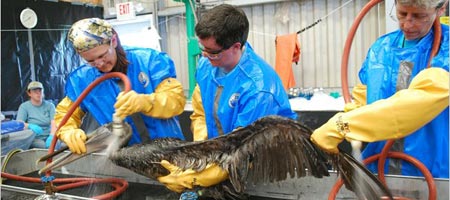Though the pelican is featured on the state flag, by the early 1960s, brown pelicans had been pushed to extinction along the Louisiana Gulf Coast by DDT and other pesticides. In 1968 pelicans were reintroduction to Louisiana from colonies in Florida. Despite ups and downs, the pelicans have slowly returned. Last year the brown pelican was taken off the endangered species list. With the Deepwater Horizon disaster, that could all change, once again.
Pelicans, Back From Brink of Extinction, Face Oil Threat
For more than a decade, the hundreds of brown pelicans that nested among the mangrove shrubs on Queen Bess Island west of here were living proof that a species brought to the edge of extinction could come back and thrive.
The island was one of three sites in Louisiana where the large, long-billed birds were reintroduced after pesticides wiped them out in the state in the 1960s.
But on Thursday, 29 of the birds, their feathers so coated in thick brown sludge that their natural white and gray markings were totally obscured, were airlifted to a bird rehabilitation center in Fort Jackson, the latest victims of the Deepwater Horizon disaster. Another dozen were taken to other rescue centers.
Six more pelicans were brought here on Friday, and as visitors to the center looked on, the birds huddled together in makeshift plywood cages and, in their unnatural stillness, looked as if the gooey muck had frozen them solid. The 29 pelicans brought in Thursday were being treated in hot rooms by workers in protective clothing.
“The pelicans are in dire trouble,” said Doug Inkley, a senior scientist with the National Wildlife Federation, who worried that the oil spill could put an end to the bird’s recovery in Louisiana.


Long-term recovery of endangered species and the habitats upon which they depend will never be achievable as long as the human population continues to grow beyond its already-unsustainable 6.5 billion. Moreover, global warming continues to shift habitat locations, habitat composition, migratory patterns, predator/prey relationships, and life patterns of those species. And there’s no sign that will be reversed in my lifetime.
As already repeatedly pointed out by other posters, while it’s appropriate to be outraged with BP, it’s even more appropriate to be outraged with ourselves, and our inability to develop a sustainable long-term energy policy in the U.S. Even something simple like a $1-a-gallon gas tax (whose revenues could go to developing alternative energy, paying down our federal debt, and offsetting the economic burden on low-income drivers) is a political non-starter. We are a nation of self-centered, self-absorbed consumers who do not understand the concept of personal sacrifice for anything bigger than ourselves.
But even a sustainable energy policy is undercut by population. As long as the U.S. and the global population continue to grow, any progress made in reducing per-capita energy consumption will be erased within a decade or two by more capita. We need to face up to some inconvenient truths. I’m afraid I’m not optimistic.
Stephanie Mcnealy
I just wanted to say how much I love the City Museum. We have vestiid the museum with our Grandchildren several times.I am so sorry you lost your creator of the museum he was wonderful and so insightful.We especially love the circus. The kids love to sit so close and feel apart of it all.Please don’t change a thing ,everything is the best. Thank You
Pingback: Why I Love Earth | Pelican Breeze